|
|
|
Sort Order |
|
|
|
Items / Page
|
|
|
|
|
|
|
| Srl | Item |
| 1 |
ID:
175470
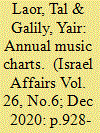

|
|
|
|
|
| Summary/Abstract |
Radio is a cultural producer and a main player in the music industry. Radio operates a system that determines which music will be broadcast and which music will not make it ‘on the air,’ functioning as gatekeeper for the general audience. Such a system gives radio significant influence on the music to which listeners are exposed. By way of offering a comprehensive picture of the diverse tastes, styles and trends of popular music in Israel, this article examines the mix of the common musical taste in Israeli society as reflected in the audience votes for the annual music charts that were broadcast on Gal Galatz radio station for 15 years. Findings show that pop music is the most common music in the charts and accounts for 45%, in contrast to rock music, which shows a declining trend. Mediterranean music has grown in popularity in recent years to become an integral part of mainstream music and accounts for a significant proportion of the mix of popular music according to Israeli listeners.
|
|
|
|
|
|
|
|
|
|
|
|
|
|
|
|
| 2 |
ID:
175461
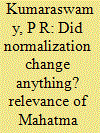

|
|
|
|
|
| Summary/Abstract |
Mahatma Gandhi’s 1938 statement that ‘Palestine belongs to the Arabs’ has not lost its relevance even after India reversed its four-decade-old policy of recognition-without-relations and normalised relations with Israel in January 1992. Critics see growing Indo-Israeli relations as an abandonment of Gandhian values while supporters use the 1938 statement to reiterate India’s continued support for the Palestinians.
|
|
|
|
|
|
|
|
|
|
|
|
|
|
|
|
| 3 |
ID:
175472
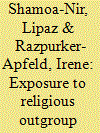

|
|
|
|
|
| Summary/Abstract |
Israel is often at the centre of debate regarding religious diversity. We examined how exposure to religious symbols is associated with intergroup anxiety perceived from the Jewish majority among Arab minority groups. We found that outgroup and ingroup priming had different consequences for the two Arab groups: when primed with outgroup Jewish concepts, Arab-Muslim persons reported higher intergroup anxiety than Arab-Christian participants. However, when primed with ingroup concepts, the two minority groups did not differ significantly in intergroup anxiety experienced in interactions with Jews. Our results convey the importance of investigating why and when religious diversity may have a negative impact on intergroup relations.
|
|
|
|
|
|
|
|
|
|
|
|
|
|
|
|
| 4 |
ID:
175471
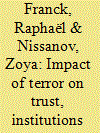

|
|
|
|
|
| Summary/Abstract |
This article takes advantage of the timing in the implementation of the European Social Survey (ESS) in Israel to assess the impact of political violence on individual attitudes towards trust, institutions and redistribution. The results suggest that a terror attack occurring on the day of an interview positively and significantly improves individual views on interpersonal trust but does not modify views on political and legal institutions. Furthermore, rocket attacks make respondents more likely to support redistribution policies, and unlike terror attacks, have a persistent impact on individual attitudes.
|
|
|
|
|
|
|
|
|
|
|
|
|
|
|
|
| 5 |
ID:
175468


|
|
|
|
|
| Summary/Abstract |
Global population ageing trends and a rising life expectancy emphasise the significance of policies regarding long-term care services provided to severely disabled elders in various countries. This article focuses on the long-term care policy implemented in Israel and examines its different features and compatibility to client needs. It shows that Israel’s long-term care policy suffers from considerable faults, notably insufficient budgeting, poor quality caregivers, low number of local long-term care workers, and excessive reliance on foreign workers. The article then suggests ways to increase efficacy and improve public policy in long-term care.
|
|
|
|
|
|
|
|
|
|
|
|
|
|
|
|
| 6 |
ID:
175465
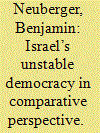

|
|
|
|
|
| Summary/Abstract |
This article raises the question whether Israel is a stable or an unstable democracy. Its conclusion – based on a theoretical analysis that relates to variables such as the legitimacy of the regime, its effectiveness, the degree of general consensus it enjoys in society at large and amongst the elites, its party system and polarisation, its socioeconomic structure, the centrality of security issues, its constitutional structure and electoral system, and the international environment – is that it is unstable. The article’s approach is comparative and relates Israel to historical case studies, like post-World War I Weimar Germany, Italy, Britain and the US; post-World War II Germany, France, Italy, and Spain; the newly democratic states of Eastern Europe; and the Third World.
|
|
|
|
|
|
|
|
|
|
|
|
|
|
|
|
| 7 |
ID:
175469
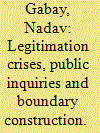

|
|
|
|
|
| Summary/Abstract |
This article examines the Or Commission of Inquiry and the discursive invention of the ‘October 2000 disturbances’ by offering a reconceptualisation of the Green Line function in the context of the Israeli state ideology (mamlachtiut). The commission presents an interesting case of a State Commission of Inquiry working under unprecedented lack of public and political legitimacy and of government support. By applying a sociopolitical perspective, the article analyzes the Or Commission not simply as a neutral administrative instrument but as a political actor that sought to enhance its legitimacy and influence public opinion and decision-makers by deviating considerably from its official mandate.
|
|
|
|
|
|
|
|
|
|
|
|
|
|
|
|
| 8 |
ID:
175466


|
|
|
|
|
| Summary/Abstract |
The new millennium experienced a transformation in the economy, moving from conservative finance institutions to online platforms, such as the Peer-to-Peer [P2P] lending websites. While these platforms gained much interest, they compose a minor share of the private lending sector. Our main interest is to assess perceptions and public attitudes about the perceived risks of lending money through the internet and using P2P lending platform. We conducted a representative survey among 1,108 Israelis, among them 4% (47) who were or are active on P2P lending platforms. The results indicate that the public is ambivalent towards these platforms. On the one hand, respondents felt the platforms are suitable for modern life and offer a form of competition to the conservative banking system; on the other hand, they expressed concern about risks to privacy, risks relating to having loans paid back, and an overall lack of understanding regarding how the platforms work. We found differences between users based on their activity on the platform, gender, income and personality characteristics. In the discussion, we connect these results to the need of the platforms to gain cognitive and socio-political legitimacy.
|
|
|
|
|
|
|
|
|
|
|
|
|
|
|
|
| 9 |
ID:
175462
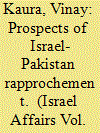

|
|
|
|
|
| Summary/Abstract |
Pakistan is among the Muslim Islamic states that do not recognise and/or maintain diplomatic relations with Israel. Yet this situation has been changing dramatically as various Muslim states are establishing and/or seriously considering relations with Israel. In recent years, Israel’s relations with Saudi Arabia and the United Arab Emirates have marked an unprecedented improvement as the focus of many Arab countries has shifted from the Israeli-Palestinian conflict to countering Iranian influence. India’s ability to maintain close relations with Israel while maintaining good relations with many Middle Eastern countries and the Palestinians is seen by Pakistan’s political elite as a strong reason for the need to have normal relations with the Jewish state. The article argues that the prospects of an Israel-Pakistan rapprochement are very dim at present due to continuing salience of ideological nature of the Pakistani state and the growing Islamist orientation of its people.
|
|
|
|
|
|
|
|
|
|
|
|
|
|
|
|
| 10 |
ID:
175464
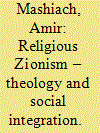

|
|
|
|
|
| Summary/Abstract |
This article explores the theology behind the integration of religious Zionists in all spheres of activity in Israel, from commerce and industry to agriculture, academia, and the defence establishment. It argues that religious Zionism is not a combination of religiosity and Zionism but a movement motivated by a distinct theology of integration that espouses a combination of Torah and work, not as part of one’s natural duties to support one’s family but as an integral part of one’s religious duties.
|
|
|
|
|
|
|
|
|
|
|
|
|
|
|
|
| 11 |
ID:
175467
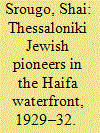

|
|
|
|
|
| Summary/Abstract |
This article traces the economic history of the small Jewish maritime community in its hometown of Thessaloniki during the 1920s and its new home of Haifa in the early 1930s. The Thessalonikians’ strong connection to port occupations made them an ideal pioneer in the Zionist scheme of creating a Jewish maritime presence in Mandatory Palestine. The Thessalonikians’ arrival in the Arab-dominated Haifa waterfront led to continuous conflict. The article examines the encounter between the Thessaloniki port culture and the Arab one in Haifa and its reflection in the core issue of the Jewish hold in the port of Haifa.
|
|
|
|
|
|
|
|
|
|
|
|
|
|
|
|
| 12 |
ID:
175463
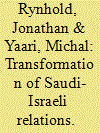

|
|
|
|
|
| Summary/Abstract |
This article analyzes the transformation of a new and important relationship between Israel and Saudi Arabia, bringing to light hidden aspects of their relations. It analyses the causes and character of this shift, as well as the opportunities, constrains and challenges for the relationship going forward. The primary cause of the transformation is the greatly increased threat posed by Iran and a shared concern about the reliability of the United States as an ally in this regard. The rise of the Iranian threat has weakened the influence of the Palestinian issue over Saudi policy to Israel. In the 2010s Israel and Saudi Arabia cooperated extensively to contain Iran, despite the absence of peace negotiations. Moreover, in contrast to the past, the Saudi regime is more flexible regarding the terms of any Israeli-Palestinian deal and sanctioned steps towards normalising relations with Israel prior to a comprehensive peace agreement. The future development of the relationship is still constrained by the transnational resonance of the Palestinian issue, but this constraint is weakening.
|
|
|
|
|
|
|
|
|
|
|
|
|
|
|
|
|
|
|
|
|